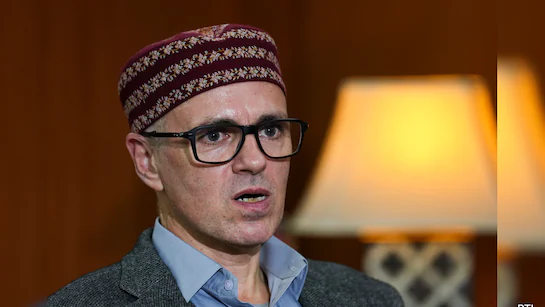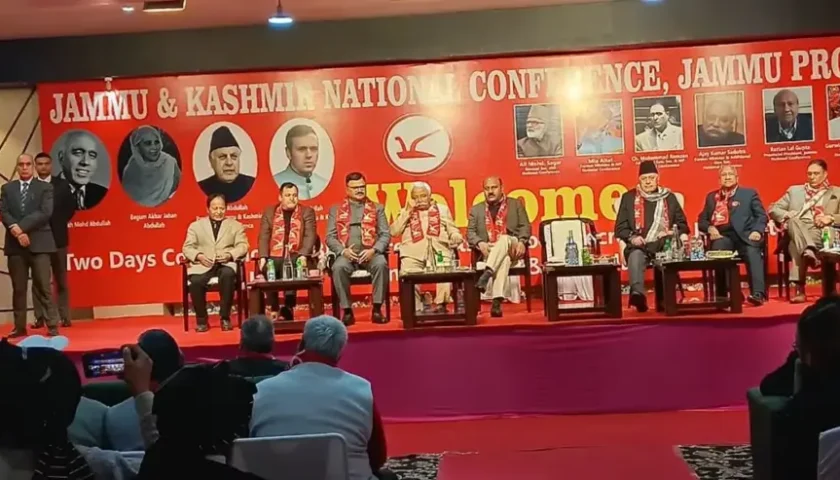Jammu & Kashmir Statehood Delay | Omar Abdullah Accuses Centre of Betrayal
By: Javid Amin | 29 September 2025
Omar Abdullah’s Stinging Charge
At a recent book launch in Delhi, Jammu & Kashmir Chief Minister Omar Abdullah tore into the central government with words that resonated across both sides of the Pir Panjal. He accused New Delhi of betraying the people of Jammu & Kashmir and Ladakh by dangling promises of statehood and constitutional safeguards but never delivering.
“Delimitation is done, elections are done, but statehood remains stalled. It’s being dangled like a carrot for good behaviour,” Abdullah said, in one of his most direct attacks on the Union government since 2019. His frustration captured the growing sentiment in the region: that statehood, once promised as a constitutional right, is now being treated as a political bargaining chip.
For many, Abdullah’s comments weren’t just political rhetoric—they were a mirror to the widening trust deficit between the Centre and the people of Jammu & Kashmir.
The Broken Roadmap to Statehood
Since the abrogation of Article 370 and the bifurcation of J&K in August 2019, the Centre has repeatedly assured the restoration of statehood once “normalcy returns.” Home Minister Amit Shah, while piloting the Reorganisation Bill in Parliament, promised that Union Territory status was “temporary” and that statehood would be restored.
Six years on, the roadmap looks broken.
-
Delimitation completed: The commission redrew constituencies, expanding the Assembly to 90 seats.
-
Elections conducted: Local body elections were held with significant voter turnout, signaling public faith in the democratic process.
-
Statehood missing: Despite both prerequisites being met, the promise remains unfulfilled.
This selective delay raises a fundamental question: if the Centre could redraw maps and hold polls, why not restore the very statehood that was assured as the natural next step?
Ladakh’s Betrayal & the Sixth Schedule Mirage
If Kashmir feels betrayed over statehood, Ladakh feels deceived over autonomy. When Ladakh was carved out as a Union Territory in 2019, it was celebrated by sections of the population, who believed it would end their historical neglect under Kashmir-centric politics.
But six years later, disillusionment runs deep. Ladakhis, particularly from tribal and Buddhist communities, were promised inclusion under the Sixth Schedule of the Constitution, which would safeguard land, culture, and resources. Yet, despite assurances during Hill Council elections, the Centre has quietly backtracked, citing defense sensitivities.
This betrayal exploded in September 2025, when protests in Leh turned violent, leaving four dead and nearly 100 injured. For the first time in decades, Ladakh—long known for peaceful demonstrations—saw mobs torching vehicles and political offices. The region that once welcomed UT status now accuses Delhi of ignoring its voice.
The Wangchuk Factor & Civil Society Suppression
At the heart of Ladakh’s turmoil stands Sonam Wangchuk, the globally renowned climate activist and educationist. Wangchuk, whose Gandhian hunger strikes had earlier drawn global attention to Ladakh’s ecological crisis, became the moral face of the statehood agitation.
His 15-day fast in Leh was peaceful, but his warnings were sharp: without dialogue and constitutional safeguards, Ladakh risked both environmental and political collapse. Days later, violence broke out.
The government’s response was swift—and controversial.
-
Wangchuk’s FCRA license cancelled, citing alleged financial irregularities.
-
CBI and Income Tax probes launched into his NGO SECMOL.
-
Preventive detention threats under the Public Safety Act surfaced.
-
Finally, in late September, Wangchuk was arrested.
For his supporters, this wasn’t law enforcement—it was a crackdown on dissent. “A Sonam Wangchuk in jail may cause them more problems than a free Sonam Wangchuk,” he had presciently warned.
His arrest, combined with curfews and detentions across Leh and Kargil, has turned Ladakh’s peaceful movement into a flashpoint for civil liberties in India.
Trust Deficit: The “Carrot for Good Behaviour”
Omar Abdullah’s metaphor of statehood as a “carrot for good behaviour” has struck a chord because it reflects what many in J&K feel: that constitutional rights are being treated as privileges subject to loyalty tests.
This sentiment is particularly damaging because voter turnout in J&K elections has been remarkably high in recent years. Despite security challenges, people queued up to cast their votes—signaling faith in the democratic process. Yet, when statehood remains withheld even after democratic participation, the message received is that voting doesn’t matter, only political obedience does.
Such delays risk eroding the very foundations of democracy. They transform statehood from a constitutional entitlement into a political trophy.
Pakistan & the Excuse Narrative
Perhaps Abdullah’s sharpest question was rhetorical: “Does Pakistan now decide whether J&K should have statehood?”
His frustration reflects a long-standing grievance—that every time J&K moves toward restoration, incidents across the Line of Control or in Kashmir are invoked to stall the process.
-
Pahalgam terror attacks become reasons for “reassessing security.”
-
Cross-border tensions are cited to justify delay.
-
International commentary is used as evidence of “sensitive timing.”
This cycle, critics argue, has turned Pakistan into a convenient excuse for denying constitutional rights to J&K citizens. It externalizes what should be an internal democratic decision.
Wider Regional Fallout
The unrest in Ladakh and the frustration in Kashmir are not isolated crises—they are interconnected symptoms of a governance vacuum.
-
Leh’s violence shows that even regions that once trusted the Centre now feel alienated.
-
Kargil’s solidarity protests reveal that the discontent isn’t limited to one community or district.
-
Kashmir’s statehood anger adds fuel to the fire, creating a larger Himalayan faultline of disillusionment.
If Ladakh and Kashmir both feel betrayed, what remains of the Union government’s narrative that abrogation of Article 370 would bring peace, prosperity, and stability?
Bottom-Line: A Reformist Lens
At the book launch, Omar Abdullah said: “Does Pakistan now decide whether J&K should have statehood? Every time we come close, something like Pahalgam happens and we’re sent back.”
His words underscore the real crisis: it is not just about constitutional delay, but about dignity. The people of J&K and Ladakh are tired of being treated as territories to be administered rather than citizens to be represented.
Restoring statehood to Jammu & Kashmir and granting constitutional safeguards to Ladakh are not acts of charity—they are democratic imperatives. Every delay deepens the trust deficit, every broken promise chips away at faith, and every crackdown makes reconciliation harder.
If governance is truly about people, not just land, then it is time for New Delhi to deliver on its own commitments.




